| Listing 1 - 10 of 24 | << page >> |
Sort by
|
Book
Year: 2015 Publisher: Washington : International Monetary Fund,
Abstract | Keywords | Export | Availability | Bookmark
 Loading...
Loading...Choose an application
- Reference Manager
- EndNote
- RefWorks (Direct export to RefWorks)
This paper analyzes saving patterns and determinants in Latin America and the Caribbean (LAC), including key policy variables and regimes. The review of previous empirical studies on LAC saving reveals contradictions and omissions. This paper presents empirical results of an extensive search of determinants of private and public saving rates, adding previously neglected variables (including different measures of key external prices and macroeconomic policy regimes), in linear form and in interactions with other saving determinants. It analyzes statistical differences in saving determinants bet
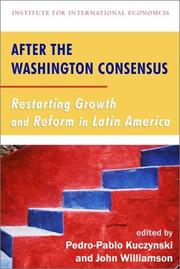
ISBN: 0881323470 9786611898045 143569225X 128189804X 0881324515 9780881323474 9781435692251 9780881324518 6611898042 9781281898043 Year: 2003 Publisher: Washington, DC : Institute for International Economics,
Abstract | Keywords | Export | Availability | Bookmark
 Loading...
Loading...Choose an application
- Reference Manager
- EndNote
- RefWorks (Direct export to RefWorks)
This volume is a successor of sorts to the Institute's 1986 volume Toward Renewed Economic Growth in Latin America, which blazed the trail for the market-oriented economic reforms that were adopted in Latin America in the subsequent years. It again presents the work of a group of leading Latin American economists who were asked to think about the nature of the economic policy agenda that the region should be pursuing after a decade that was punctuated by crises, achieved disappointingly slow growth, and saw no improvement in the region's highly skewed income distribution. The study diagnoses the first-generation (liberalizing and stabilizing) reforms that are still lacking, the complementary second-generation (institutional) reforms that are necessary to provide the institutional infrastructure of a market economy with an egalitarian bias, and the new initiatives that are needed to crisis-proof the economies of the region to end its perpetual series of crises. Contributors: Daniel Artana, Nancy Birdsall, Roberto Bouzas, Saúl Keifman, Pedro-Pablo Kuczynski, Ricardo López Murphy, Claudio de Moura Castro, Fernando Navajas, Patricio Navia, Liliana Rojas-Suarez, Jaime Saavedra, Miguel Székely, Andrés Velasco, John Williamson, and Laurence Wolff.
Book
ISBN: 9789004175914 9004175911 9786612401343 1282401343 9047429354 9789047429357 Year: 2009 Volume: 3 Publisher: Leiden: Brill,
Abstract | Keywords | Export | Availability | Bookmark
 Loading...
Loading...Choose an application
- Reference Manager
- EndNote
- RefWorks (Direct export to RefWorks)
The forces of industrialisation, urbanisation, globalisation and technological change have washed away the pre-modern outlook of most Latin American economies. Despite the improved opportunities of social mobility offered by economic modernisation, current income inequality levels (still) appear extraordinary high. Has Latin America always been unequal? Did the region fail to settle a longstanding account with its colonial past? Or should we be reluctant to point our finger so far back in time? In a comparative study of asset and income distribution Frankema shows that both the levels, and nature, of income inequality have changed significantly since 1870. Besides the deep historical roots of land and educational inequality, more recent demographic and political-institutional forces are taken on board to understand Latin America’s distributive dynamics in the long twentieth century.
Income distribution --- Equality --- Latin America --- Economic conditions --- Equality --Latin America. --- Income distribution --Latin America. --- Latin America --Economic conditions --1982-. --- Economic History --- Business & Economics --- Income distribution - Latin America --- Equality - Latin America --- Latin America - Economic conditions - 1982 --- -Income distribution - Latin America --- -Income distribution
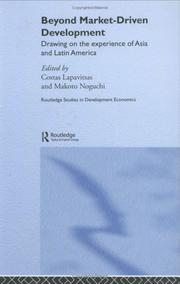
ISBN: 1134240708 1281158011 9786611158019 0203007514 0415359600 0415646065 9780203007518 9780415359603 6611158014 9781134240708 9781134240692 1134240694 9781134240654 9780415646062 Year: 2005 Publisher: London Routledge
Abstract | Keywords | Export | Availability | Bookmark
 Loading...
Loading...Choose an application
- Reference Manager
- EndNote
- RefWorks (Direct export to RefWorks)
Because their economies were regulated, their financial systems 'repressed' and their states interventionist, for many years the countries of East Asia challenged the Washington consensus, offering an alternative development paradigm. However, in the 1990's, Asian capitalism was disrupted following Japan's stagnation and the financial crisis of 1997-98.Treading the unexplored theoretical terrain created by the simultaneous decline of the Washington Consensus and Asian developmentalism, this revealing book analyzes the comparative political economy of East Asia and Latin Americ
Asia - Economic conditions. --- Asia -- Economic conditions. --- Asia - Economic policy. --- Asia -- Economic policy. --- Latin America - Economic conditions. --- Latin America -- Economic conditions. --- Latin America -- Economic policy. --- Business & Economics --- Economic History --- Asia --- Latin America --- Economic conditions. --- Economic policy. --- Economic conditions. Economic development --- East Asia --- ASI / Asia - Azië - Asie --- LAM / Latin America - Latijns Amerika - Amérique Latine --- AR / Argentina - Argentinië - Argentine --- KR / South Korea - Zuid Korea - Corée du Sud --- MX / Mexico - Mexique --- CN / China - Chine --- 331.31 --- 338.340 --- Economisch beleid --- Algemene ontwikkeling in de Derde Wereld
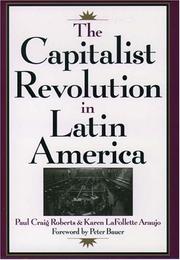
ISBN: 0195111761 0198027192 1280529318 1429414677 9780198027195 019771000X Year: 1997 Publisher: New York ; Oxford Oxford University Press
Abstract | Keywords | Export | Availability | Bookmark
 Loading...
Loading...Choose an application
- Reference Manager
- EndNote
- RefWorks (Direct export to RefWorks)
This work looks at what is happening in Latin America and what it will mean to countries outside the region, especially the USA. It takes an optimistic view of the future of Latin America and criticizes institutions like the World Bank and the IMF for subsidizing the old regime.
Capitalism --- Capitalisme --- Latin America --- Amérique latine --- Economic conditions --- Economic policy --- Conditions économiques --- Politique économique --- LAM / Latin America - Latijns Amerika - Amérique Latine --- 331.31 --- 331.30 --- 338.313 --- 331.32 --- Economisch beleid. --- Economische toestand. --- Kapitalisme. --- Structuur van de economie. --- Amérique latine --- Conditions économiques --- Politique économique --- Economic policy. --- E-books --- Economische toestand --- Economisch beleid --- Structuur van de economie --- Kapitalisme --- 1982-.... --- Latin America - Economic conditions - 1982 --- -Latin America --- -Capitalism --- Latin America - Economic conditions - 1982-
Book

ISBN: 1451863853 1462349803 1451995326 9786613828644 1452701717 1283516195 Year: 2006 Publisher: Washington, D.C. : International Monetary Fund,
Abstract | Keywords | Export | Availability | Bookmark
 Loading...
Loading...Choose an application
- Reference Manager
- EndNote
- RefWorks (Direct export to RefWorks)
This paper presents empirical evidence on convergence of per capita output for regions within six large middle-income Latin American countries: Argentina, Brazil, Chile, Colombia, Mexico, and Peru. It explores the role played by several exogenous sectoral shocks and differences in steady states within each country. It finds that poor and rich regions within each country converged at very low rates over the past three decades. It also finds evidence of regional "convergence clubs" within Brazil and Peru- the estimated speeds of convergence for these countries more than double after controlling for different subnational levels of steady state. For the latter countries and Chile, convergence is also higher after controlling for sector-specific shocks. Finally, results show that national disparities in per capita output increased temporarily after each country pursued trade liberalization.
Economic development -- Latin America. --- Electronic books. -- local. --- Latin America -- Economic conditions -- Regional disparities. --- Latin America -- Economic conditions. --- Business & Economics --- Economic History --- Economic development --- Latin America --- Economic conditions --- Regional disparities. --- Economic conditions. --- Asociación Latinoamericana de Libre Comercio countries --- Neotropical region --- Neotropics --- New World tropics --- Spanish America --- Exports and Imports --- Public Finance --- Agribusiness --- Industries: Manufacturing --- Natural Resource Extraction --- Trade Policy --- International Trade Organizations --- Agriculture: General --- Industry Studies: Manufacturing: General --- Industry Studies: Primary Products and Construction: General --- National Government Expenditures and Related Policies: General --- International economics --- Agricultural economics --- Manufacturing industries --- Extractive industries --- Public finance & taxation --- Trade liberalization --- Agricultural sector --- Manufacturing --- Mining sector --- Public expenditure review --- Commercial policy --- Agricultural industries --- Mineral industries --- Expenditures, Public --- Brazil
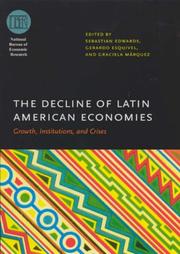
ISBN: 0226185001 9786612004834 1282004832 0226185036 9780226185033 9780226185002 Year: 2007 Publisher: Chicago University of Chicago Press
Abstract | Keywords | Export | Availability | Bookmark
 Loading...
Loading...Choose an application
- Reference Manager
- EndNote
- RefWorks (Direct export to RefWorks)
Latin America's economic performance is mediocre at best, despite abundant natural resources and flourishing neighbors to the north. The perplexing question of how some of the wealthiest nations in the world in the nineteenth century are now the most crisis-prone has long puzzled economists and historians. The Decline of Latin American Economies examines the reality behind the struggling economies of Argentina, Chile, and Mexico. A distinguished panel of experts argues here that slow growth, rampant protectionism, and rising inflation plagued Latin America for
Latin America - Economic conditions. --- Latin America -- Economic conditions. --- Latin America - Economic policy. --- Latin America -- Economic policy. --- Latin America - History. --- Latin America -- History. --- Latin America - Politics and government. --- Latin America -- Politics and government. --- Business & Economics --- Economic History --- Latin America --- Economic conditions --- Economic policy --- Politics and government --- Asociación Latinoamericana de Libre Comercio countries --- Neotropical region --- Neotropics --- New World tropics --- Spanish America --- Economic conditions. --- Economic policy. --- Politics and government. --- History. --- History --- E-books --- BUSINESS & ECONOMICS / General. --- latin america, mexico, argentina, chile, politics, government, history, economics, unrest, revolution, corruption, inflation, protectionism, growth, textiles, industry, nonfiction, stablization, foreign advisors, currency, lending, governance, solvency, risk, emerging markets, debt, inequality, wealth, poverty, portugal, taxation.
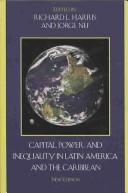
ISBN: 0742555240 0742572501 0742555232 1299788858 9780742572508 9780742555235 9781299788855 9780742555242 Year: 2008 Publisher: Lanham Rowman & Littlefield Publishers
Abstract | Keywords | Export | Availability | Bookmark
 Loading...
Loading...Choose an application
- Reference Manager
- EndNote
- RefWorks (Direct export to RefWorks)
Comprehensive and interdisciplinary, the thoroughly updated and revised second edition of Capital, Power, and Inequality in Latin America is an engaging critical analysis of the major political, economic, social, and ecological conditions in Latin America and the Caribbean. Expert chapter authors describe and analyze the economies and trading relations, politics and state policies, social inequalities and social injustices, indigenous communities, gender relations, influence of religion, wide array of social movements, and social ecology of the societies in this important region of the world.
Equality -- Latin America. --- Latin America -- Economic conditions -- 1982-. --- Latin America -- Politics and government -- 1980-. --- Latin America -- Social conditions -- 1982-. --- Power (Social sciences) -- Latin America. --- Power (Social sciences) --- Equality --- Business & Economics --- Economic History --- Latin America --- Economic conditions --- Social conditions --- Politics and government --- Empowerment (Social sciences) --- Political power --- Exchange theory (Sociology) --- Political science --- Social sciences --- Sociology --- Consensus (Social sciences)
Book
ISBN: 9781484301548 1484301544 Year: 2014 Publisher: Washington, D.C. : International Monetary Fund,
Abstract | Keywords | Export | Availability | Bookmark
 Loading...
Loading...Choose an application
- Reference Manager
- EndNote
- RefWorks (Direct export to RefWorks)
Over the past fifteen years countries in Latin America made tremendous progress in strengthening their economies and improving living standards. Although output fell temporarily during the global financial crisis, most economies staged a rapid recovery. However, economic activity across the region has been cooling off and the region is facing a more challenging period ahead. This book argues that Latin America can rise to the challenge, and policymakers in the region are already implementing reforms in education, energy, and other sectors. More is needed, and more is possible, in Latin America’s quest to continue to improve living standards.
Economic development --- Fiscal policy --- Prices --- Capital movements --- Financial risk management --- Risk management --- Commercial products --- Commodity prices --- Justum pretium --- Price theory --- Consumption (Economics) --- Cost --- Costs, Industrial --- Money --- Cost and standard of living --- Supply and demand --- Value --- Wages --- Willingness to pay --- Latin America --- Economic conditions. --- Economic policy. --- E-books --- Latin America -- Economic conditions. --- Latin America -- Economic integration. --- Latin America -- Politics and government. --- United States
Book
Year: 2012 Publisher: New York : Columbia University Press,
Abstract | Keywords | Export | Availability | Bookmark
 Loading...
Loading...Choose an application
- Reference Manager
- EndNote
- RefWorks (Direct export to RefWorks)
This book addresses two important and related questions: does participation in a market economy help or hurt indigenous peoples and how does it affect the conservation of tropical rainforest flora and fauna? Oddly, there have been few quantitative studies that have addressed these issues.Ricardo Godoy's research takes an important step toward rectifying this oversight by investigating five different lowland Amerindian societies of tropical Latin America?all of which are experiencing deep changes as they modernize. Godoy examines the effect of markets on a broad range of areas incl
Deforestation -- Economic aspects -- Latin America. --- Human ecology -- Government policy -- Latin America. --- Indians of Central America -- Social conditions. --- Indians of South America -- Social conditions. --- Latin America -- Economic conditions. --- Latin America -- Social conditions. --- Rain forest ecology -- Latin America. --- Rain forests -- Economic aspects -- Latin America. --- Social change -- Latin America.
| Listing 1 - 10 of 24 | << page >> |
Sort by
|

 Search
Search Feedback
Feedback About UniCat
About UniCat  Help
Help News
News